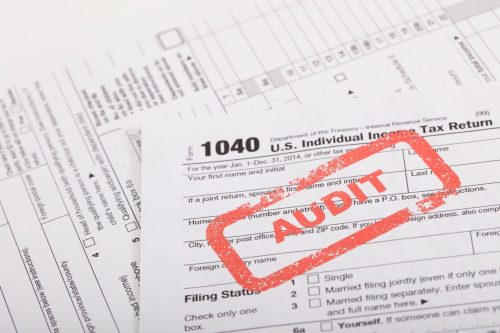IRS Warns That Filing These Forms Can Get You Audited and Fined

There’s less than a month left for most people to file their 2023 taxes. But even if you’re frantically trying to pull everything together ahead of the April 18 deadline, you still need to be careful about what you’re submitting. The Internal Revenue Service (IRS) just issued a last-minute warning to taxpayers about troublesome tax advice currently circulating on social media. Based on these trending tips, you might be tempted to put incorrect information on forms without thinking things through—and that can have serious consequences. Read on to find out why the agency says filing certain forms could get you audited and fined.
READ THIS NEXT: IRS Warns That Claiming These Credits Can Get You Audited and Fined.
The IRS issued a new alert about troubling tax advice.

If you’re trying to get your tax return in at the last minute, you might be looking online for helpful advice. But in a March 28 press release, the IRS cautioned taxpayers against believing everything they see on the internet. Trusting some online guidance can put you at risk for “compromising tax situations,” according to the agency.
“There are many ways to get good tax information, including from a trusted tax professional, tax software and IRS.gov. But people should be incredibly wary about following advice being shared on social media,” IRS Commissioner Danny Werfel said in a statement. “The IRS continues to see a lot of inaccurate information that could get well-meaning taxpayers in trouble.”
The agency is now warning about filing fraudulent forms.

Online claims are currently pushing out bad advice involving filing certain tax forms. The IRS said it is aware of “various filing season hashtags and social media topics” this year that are pushing people into including inaccurate and potentially fraudulent information with their return.
As a result, the agency has added fraudulent form filing to their 2023 Dirty Dozen campaign—which is a list that is compiled annually and covers the “common scams” taxpayers are likely to encounter while trying to prepare their taxes.
“People should remember that there is no secret way to fill out a form and simply get a larger refund that they aren’t entitled to,” Werfel warned. “Remember, if it sounds too good to be true, it probably is.”
RELATED: For more up-to-date information, sign up for our daily newsletter.
There are two of these schemes circulating social media right now.

In its new alert, the IRS said it has recently seen two major examples of fraudulent form filing scams circulating around social media right now: Form 8944 fraud and Form W-2 fraud. “Both schemes encourage people to submit false, inaccurate information in hopes of getting a refund,” the agency explained.
Form 8944, otherwise known as the Preparer e-file Hardship Waiver Request, is meant to be used by a “very limited, specialized group,” according to the IRS. Social media is telling a different story, however.
“Posts claim that Form 8944 can be used by taxpayers to receive a refund from the IRS, even if the taxpayer has a balance due,” the agency explained. “This is false information. Form 8944 is for tax professional use only.”
The other scam spreading involves the W-2 form. Online posts are encouraging people to use tax software to manually fill out this form and include false income information, according to the IRS.
“In this W-2 scheme, scam artists suggest people make up large income and withholding figures as well as the employer it’s coming from,” the agency said. “Scam artists then instruct people to file the bogus tax return electronically in hopes of getting a substantial refund.”
You could get audited and fined by the IRS for false information.

You might be desperate to lower your tax bill or increase your refund before the filing deadline. But don’t let that have you falling for bad advice about these forms.
The IRS reserves the right to audit tax returns to verify that taxpayers are reporting the correct information. And the agency often targets returns that appear to be using “abusive tax avoidance transactions” or that list income that does not match reported income from employers and banks.
“While Form 8944 is a legitimate IRS tax form, it’s intended for a targeted group of tax return preparers who are requesting a waiver so they can file tax returns on paper instead of electronically,” the IRS said in its newest alert. “It is not in any way a form the average taxpayer can use to avoid tax bills. Taxpayers who intentionally file forms with false or fraudulent information can face serious consequences, including potentially civil and criminal penalties.”
The agency warned that it is also actively monitoring returns for W-2 fraud, and urged taxpayers not to fall for this scheme either.
“The IRS works with payroll companies and large employers—as well as the Social Security Administration—to verify W-2 information,” the alert explained. “Taxpayers who knowingly file fraudulent tax returns potentially face significant civil and criminal penalties.”
Best Life offers the most up-to-date financial information from top experts and the latest news and research, but our content is not meant to be a substitute for professional guidance. When it comes to the money you’re spending, saving, or investing, always consult your financial advisor directly.
- Source: https://www.irs.gov/newsroom/dirty-dozen-taking-tax-advice-on-social-media-can-be-bad-news-for-taxpayers-schemes-circulating-involving-tax-forms
- Source: https://www.irs.gov/newsroom/dirty-dozen
- Source: https://www.irs.gov/forms-pubs/about-form-8944
- Source: https://www.irs.gov/forms-pubs/about-form-w-2
- Source: https://www.irs.gov/pub/irs-news/fs-06-10.pdf